
Federal government agrees on key points regarding cannabis: personal cultivation and pilot project
After discussions with the EU Commission, the Federal government has agreed on key points regarding cannabis. In the future, adult individuals should be able to cultivate cannabis in certain quantities for personal use or in non-profit associations. Additionally, as part of a regional pilot project, they should be able to purchase cannabis from licensed specialty stores. The aim of these measures is to control the quality, prevent the distribution of contaminated substances, and ensure the best possible protection for young people and consumers’ health and safety. At the same time, the black market should be curbed.
In a first step, cultivation in non-profit associations and personal cultivation should be allowed nationwide. In a second step, the distribution through specialty stores will be implemented as a scientifically designed, regionally limited, and time-limited pilot project. The pilot project offers the opportunity to scientifically investigate the effects of a commercial supply chain on health and youth protection as well as the black market.
Cannabis is a widely used recreational drug. It is often offered and used illegally in Germany. This frequently endangers people’s health. Adolescents, in particular, are affected in their social and cognitive development by cannabis use. Despite this, an increasing number of adolescents consume the drug. Black market cannabis is often contaminated and poses additional health risks. We cannot tolerate this any longer. Therefore, we are taking the step to allow controlled distribution of cannabis to adults within clear boundaries and to push back the black market, accompanied by prevention measures for adolescents. The protection of health is the top priority in this regard. The current cannabis policy has failed. Now we need to explore new paths.
Federal press conference live stream on April 12, 2023 (starting at minute 9:33):
The previous restrictive approach to cannabis in Germany has failed. The prohibition of cannabis criminalizes countless people, drives them into criminal structures, and ties up immense resources in law enforcement agencies. It is time for a new approach that allows more individual responsibility, reduces the black market, and relieves police and prosecutors. We trust people more, without downplaying the risks that can arise from cannabis consumption.
The consumption of cannabis is a social reality. Decades of prohibition policies have closed their eyes to this reality and caused problems, especially for our children and adolescents, the health of consumers, and law enforcement agencies. Now we are creating a coherent and pragmatic cannabis policy that covers everything from cultivation to consumption. No one should have to buy from dealers anymore without knowing what they are getting into. Through controlled cultivation and distribution within cannabis clubs, we strengthen youth and health protection. And we are depriving organized crime of the ground, which doesn’t even shy away from selling to children. With a regional pilot project, we are also exploring the possibilities of a commercial supply chain.
The 2-pillar model, also known as “Club Cultivation & Regional Model/CARe,” was developed under the leadership of the Federal Ministry of Health. The professional responsibilities of the participating ministries – Federal Ministry of the Interior, Federal Ministry of Justice, Federal Ministry of Agriculture, Federal Ministry of Economic Affairs, and Foreign Office – were taken into account. The key points of the model also consider the EU and international legal limits to ensure a legally compliant implementation.
Based on these key points, the Federal government will now present a draft law that will be presented soon.
The 2-pillar model in detail:
1. Pillar: Private & communal, non-profit personal cultivation.
- Non-profit associations are allowed to cultivate cannabis for recreational purposes under strict and clearly defined legal framework and distribute it to members for personal consumption. The members should actively participate in the association as much as possible. Participation of association members in cultivation is allowed, but outsourcing cultivation to third parties is prohibited.
- The conditions for cultivation and distribution will be regulated in a separate law.
- In addition to the harvested recreational cannabis, the association may also distribute seeds and cuttings produced by the association to its members for personal cultivation. It is being examined whether and how seeds and/or cuttings for personal cultivation can be obtained through the associations at cost without requiring membership in an association.
- Approval and supervision will be carried out by state authorities, among others, regarding compliance with quantity, quality, and youth protection requirements, through on-site visits and random checks. Personal data collected by the associations in connection with the distribution of recreational cannabis, seeds, and cuttings to members may not be disclosed to unauthorized third parties or used for other purposes. Membership in multiple associations is prohibited.
- Fines, revocation of approval, or imprisonment may be imposed for repeated violations.
- Cultivation and harvest quantities are oriented towards meeting demand. There are reporting and documentation obligations regarding the quantities produced and distributed. There is a ban on the import or export of recreational cannabis.
- Membership fees cover the costs, which are staggered according to the quantity distributed (possibly with a basic flat rate and an additional amount per gram distributed).
- The maximum number of members per association is limited to 500, with a minimum age of 18 years and residency or habitual residence in Germany. The number of associations can be limited based on population density.
- Associations can only be led by natural persons whose reliability has been verified. The association is managed according to the principles of association law. Personal liability of the association’s board members for financial damages or the violation of official regulations should only occur in cases of intent or gross negligence.
- The procurement of seeds for the initial cultivation in the associations is allowed. The possibility of importing seeds from third countries is being evaluated.
- The distribution of the harvested cannabis (flowers) is only allowed to members; no distribution to third parties; a maximum 25g of cannabis per day, maximum. 50g per month, maximum. 7 seeds or 5 cuttings per month. The distribution to adolescents under the age of 21 is limited to a quantity of 30g per month, with an additional limitation on the permissible THC content (limit to be determined). This should be reflected in the selection of varieties.
- It is being examined whether and how seeds and cuttings can be exchanged free of charge between associations to ensure quality.
- For communal personal cultivation, quality requirements apply (in particular, the prohibition of additives or adulterations such as tobacco or flavors, requirements for plant protection products, no synthetic cannabinoids).
- The dispensing is only done in pure form (flowers or resin) in neutral packaging or loose with attached information about the product (strain, including their usual average THC content and content of other cannabinoids such as CBD), dosage and application as well as risks of consumption and counseling centers.
- Consumption in the premises of the association is prohibited as well as public consumption near schools, kindergartens or similar institutions, as well as in pedestrian zones until 8pm.
- The issuance of alcohol, tobacco, or other pleasure and intoxicating substances is also prohibited.
- Access is only allowed for adults with a strict obligation to verify their age.
- There are regulations regarding youth protection and prevention: Youth protection, addiction, and prevention officers appointed by the association have demonstrated expertise; there is a mandatory cooperation with the local addiction prevention or counseling center and a minimum distance to schools, kindergartens, etc.
- The associations and cannabis products are subject to a general advertising ban. Permissible are factual information.
- Minimum security measures (e.g. burglar-proof premises, fencing) prevent unauthorized access by third parties.
- Legal possession (carrying in public) is possible for personal use up to 25g; criminal provisions apply for possession exceeding this amount, for trade and distribution to non-members, as well as for distribution to children and adolescents, and for the distribution of cannabis not grown in the associations themselves.
- The limits for driving under the influence of cannabis in road, maritime, and air transport will be reviewed with the involvement of relevant experts. Regulations regarding the admissibility of driving under the influence of cannabis are based solely on the requirements of traffic safety.
- The decriminalized private cultivation for personal use includes a maximum of… 3 female flowering plants and must be protected from access by children and adolescents.
- It will be possible to have convictions registered exclusively for acts related to cannabis, for which the law no longer provides for punishment in the future (possession up to 25g/cultivation of up to 3 female flowering plants), deleted from the Federal Central Register upon request. The entry into force of the law will terminate ongoing investigations and criminal proceedings for these acts through the means already provided for in the German Code of Criminal Procedure (StPO).
- The scope of the Federal Nonsmoker Protection Act is extended to include the smoking of products in connection with cannabis; additional nonsmoker protection in accordance with the regulations for tobacco must be ensured.
- Participation in early intervention and prevention programs for minors who possess or consume cannabis is mandatory.
- After 4 years, the guidelines for pillar 1 will be evaluated with the aim of examining possible adjustments regarding health and youth protection as well as curbing the black market.
Additionally, the measures for youth and health protection formulated in the policy paper of October 26, 2022 are to be implemented. The intention is to design this regulatory project in such a way that no notification obligation is triggered.
2nd Pillar: Regional pilot project with commercial supply chains
The second pillar builds on the approaches outlined in the paper “key points” of October 26, 2022, including an evaluation, to implement a scientifically designed, regionally and temporarily limited model on the way to a nationwide regulation: companies are allowed to produce, distribute, and sell recreational cannabis in licensed and state-controlled specialty stores to adults. With this pillar, the effects of a commercial supply chain on health and youth protection as well as the black market can be scientifically investigated.
- The project duration is 5 years from the establishment of the supply chain.
- The distribution is limited to certain districts/cities in several federal states, and to adult residents at designated points of sale (opt-in approach).
- As part of the law, the authorization of the distribution of edibles while ensuring strict youth and health protection measures will be examined.
- This model will be scientifically accompanied and evaluated. The findings will be made available to European partners and the EU Commission.
- The health and youth protection also follow the key points paper of October 26th, 2022.
The implementation of the 2-pillar model takes place within the framework of international and EU legal provisions. The federal government will notify the United Nations bodies about the project and provide a statement to explain the compatibility of the model with the legal requirements of the UN conventions. A close and transparent coordination with European partners is important.
The participating federal ministries work in a coordinated manner with the overall leadership of the Federal Ministry of Health on both pillars of the model. Concrete draft laws will be developed, with the working draft for pillar 1 to be presented in April 2023, followed by the draft law for pillar 2. The results of the already commissioned scientific study on the effects of the legalization of recreational cannabis on health and youth protection in other states will be taken into account for both pillars.
At the same time, the federal government continues its efforts to promote its approaches among European partners and to examine whether an initiative of a sufficient number of EU member states is possible to flexibilize and further develop the relevant EU legal framework in the medium term. The government emphasizes, however, that this part of the project is likely to remain subject to notification requirements.









